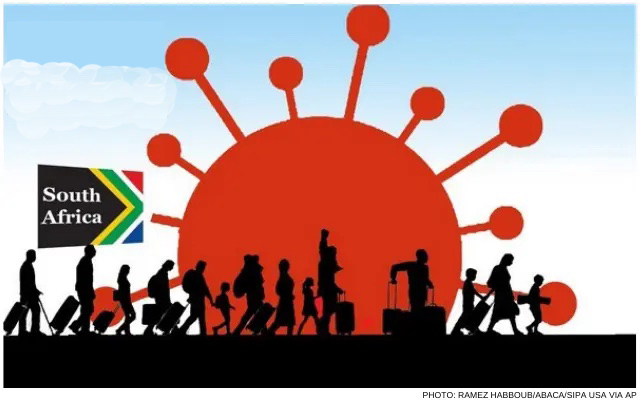Uncategorized
Jews in Today’s South Africa Feel Embattled

By HENRY SREBRNIK Since the Gaza war began last year, South African Jews feel like they are cats on a hot tin roof.
While South African Jews have risen to prominence and helped build the country, there is a deep-seated fear of the current government and for the community’s safety, because for the ruling African National Congress (ANC), the Palestine issue is a deeply felt ideological cause.
South African public opinion is vehemently pro-Palestinian. This was already the case before the current war, and since then, tensions have only increased. In the immediate aftermath of Hamas’ Oct. 7, 2023, attacks on Israel, South Africa’s International Relations Minister Naledi Pandor held high-level discussions with senior members of Hamas, a move that was met with criticism.
South African Chief Rabbi Warren Goldstein condemned the government at a pro-Israel rally. After Pandor’s diplomatic outreach to Hamas, Goldstein changed the Prayer for the Republic of South Africa, said regularly at congregations across the country, from asking God to protect “the president and the deputy president all members of the government,” to asking for protection for “all the people of this country,” a measure, he wrote in a letter to South African rabbis, that was taken in “extreme situations, for government violations of morality so grotesque they undermine the integrity of praying.”
To the estimated 60,000 South African Jews, their government appears to have shown little empathy for the Jewish victims of terror. The South African Jewish Board of Deputies (SAJBD), the umbrella organization that represents the country’s Jewish community, has noted a sharp increase in antisemitism.
Since then, the South African government, with broad popular support, has accused Israel of genocide before the International Court of Justice (ICJ). For many Jewish groups in the country, the decision to side against Israel was seen as evidence of antisemitism.
Now, the city of Johannesburg plans to rename the road on which the American consulate is located after Palestinian terrorist Leila Khaled. It was proposed by a former mayor, Thapelo Amad. Sandton Drive, its current name, is a central artery in Johannesburg, and Sandton, the neighbourhood in which the road is located, is home to many of South Africa’s Jews. The area is also home to at least four synagogues among other Jewish institutions.
Khaled, a member of the Popular Front for the Liberation of Palestine, who is now 80 years old, gained infamy in 1969 when she was part of a group who hijacked a Trans World Airlines flight on a journey from Rome to Tel Aviv, Israel. She became known as the first woman to hijack a plane.
“We stand with Hamas, Hamas stands with us, together we are Palestine and Palestine will be free,” Amad posted online. “With our souls, with our blood, we will conquer Al Aqsa.”
All of this is now reshaping how many South African Jews view themselves, their place in the country and their relationships with their fellow citizens. It is in this crucible that they are now forced to reconcile their own complex history in South Africa with the reality of a country whose national identity is increasingly built in opposition to a foreign country, Israel, that they hold dear.
Indeed, most Jewish institutions in South Africa today are oriented toward Israel. Herzlia, the primary Jewish school in Cape Town, is named after Theodor Herzl, and its motto (“Im Tirtzu”) is based on the famous Zionist line about willing Israel into existence.
The school has been the center of controversy, as the hard-left Economic Freedom Fighters political party last year called for it to be deregistered with the government, a move that would cause it to lose funding, for being too “pro-Israel.” Among other issues, the party cited the high number of Herzlia graduates who move to Israel and join the Israeli military. The exact number of Herzlia alumni who do so is unclear, but that hasn’t stopped it from becoming a highly contentious topic.
The rhetoric reached a boiling point last December, when a speaker at a large pro-Palestine rally in Cape Town targeted Herzlia directly, saying, “We know where the murderers come from — they come from Herzlia, here in Cape Town.” After the rally, the foreign ministry said it would investigate if any citizens were serving in the Israeli military and arrest any that had. These events were used by Jewish authorities as evidence of their threatened status in South Africa.
The South African Jewish community traces its lineage almost exclusively to the Lithuanian Jews who fled Europe before and during the Holocaust. They arrived in a country where they were greeted with skepticism. There were undeniable pockets of support for Nazism among some political parties at the time.
When the Afrikaner-led National Party took power in 1948, however, it didn’t elevate these views into the political discourse. Instead, the party focused on creating the apartheid system of minority rule and gaining the full support of all white citizens, including Jews.
Jews were significantly over-represented in the struggle against apartheid, with many in the ANC, but most lived with it. Not until 1985 did Jewish community leaders condemn it outright. As Cyril Harris, chief rabbi from 1987 to 2004, later told the Truth and Reconciliation Commission: “The Jewish community benefited from apartheid and an apology must be given.”
Many South African Jews today, though, fear that the country may fall into economic ruin. Israel has always been viewed as an exit plan thanks to its Law of Return, which grants them automatic Israeli citizenship.
Henry Srebrnik is a professor of political science at the University of Prince Edward Island.
Uncategorized
At Berlin screening, former Israeli hostages see film about their captivity rewritten after redemption
(JTA) — BERLIN — They stood outside Berlin’s Babylon theater, bundled against the cold, laughing and dragging on cigarettes: the Cunio twins David and Eitan, and their younger brother Ariel.
David and Ariel were among the last Israeli hostages released in October from Hamas captivity, after 738 days. Their presence in Berlin — for a screening of a film about them, now recut with a redemptive ending — felt almost like an apparition. On the other side of two heavy glass doors were hundreds of theatergoers, people who had long waited for this moment.
The brothers and their extended family were in Berlin for a second premiere of Tom Shoval’s film “Letter to David.” The original film, shown in 2025 at the Berlin International Film Festival, or Berlinale, dove deep into the struggles of a family whose members had been abducted from Kibbutz Nir Oz on Oct. 7, 2023. By then, six kidnapped members of the family, including three children, had been freed. But David and Ariel remained in captivity.
“Last year I was standing before the screening with a poster of David and Ariel. I was determined, every time I showed the film, to say that it’s an unfinished film,” Shoval told the sold-out audience at the theater in former East Berlin.
“And now I’m standing here. I have David in the audience, and I have Ariel in the audience,” he continued. “This is a precious, precious moment.”
The film “is a testament to love, hope and all the people who did not give up during the two years I was in captivity,” David Cunio said in Hebrew, standing on the stage with his extended family. “You gave me a voice when I could not be present. You were there for me.”
The film’s second showing came as tensions over the war in Gaza and Germany’s support for Israel roiled the Berlinale. After the jury’s president, director Wim Wenders, brushed off a journalist’s exhortation for the festival to take a stand against Israel, the Indian author Arundhati Roy announced she would not attend, and some 80 filmmakers and stars signed an open letter of protest.
Festival director Tricia Tuttle issued a statement saying that “artists should not be expected to comment on all broader debates about a festival’s previous or current practices over which they have no control. Nor should they be expected to speak on every political issue raised to them unless they want to.”
Journalists and filmmakers continued to raise the issue, even on the festival’s final weekend, when some award winners — including the Syrian-Palestinian director Abdullah Al-Khatib, who won best debut film — swatted back at the festival jury, criticizing what they see as Germany’s general support for Israel. Al-Khatib’s allegation that Germany has been “partners in the genocide in Gaza by Israel” prompted a German minister to walk out of the awards ceremony on Sunday.
Friday’s screening of “Letter to David” was by contrast a love fest, and the two police cars out front and uniformed officers circulating inside appeared to have little to do. The audience gave the entire family a standing ovation before the screening.
“I think this is a piece of history,” audience member Nirit Bialer, an Israeli who has lived for years in Berlin, said in an interview. “Just seeing the family, and just following the story about this family on the media, going to the Hostages Square in Israel every time I was there in the last two years: Wow, I’m speechless.”
The film’s original ending showed twins David and Eitan Cunio as actors, grappling with each other in an embrace that is both tender and violent, in a scene from Shoval’s feature film, “Youth,” screened at the Berlinale in 2013.
That ending now segues into a new conclusion, in which the reunited Cunio family embraces. They also view the film together, and Shoval captures their faces as the projector beams from behind.
Shoval said in an interview that he had not changed anything in the first part of the film. “I wanted to leave it as a time capsule, in a way, of how we perceived it back a year ago,” he said.
Though he had been invited to be with the family at their reunion, he chose not to, explaining, “I thought it’s a moment that belongs to them and not to me.”
But he spoke with David soon after he was released. And shortly afterward, he visited Sharon and David Cunio at their home. “I came in the morning and we sat until sunset together and we talked. Even when I’m thinking about it now, I’m getting emotional, because it was really…” He paused. “You’re waiting for a moment for this for so long.”
The Friday screening was not an official part of the Berlinale, but the beleaguered festival director Tuttle made a point of taking the stage herself. The film has been “finished in the way that Tom only hoped and dreamed and believed that he would be able to finish it,” she told the audience.
“We were horrified along with the world and all of you when David Cunio and many members of his family were abducted by Hamas,” she said. And on their release “we rejoiced with everyone as well.”
Saying that the new version was completed too late to be included in the festival schedule, Tuttle thanked two co-production companies that work closely with Israeli artists for backing Friday’s screening: the Israel-based Green Productions and the Berlin-based Future Narrative Fund.
Audience members seemed loath to leave the theater after the screening, lingering over what some described as mix of happiness and worry.
“The fact that David is able to see the movie makes us see the movie in a different way,” commented Konstantin, who had seen the original version last year. A young Jewish actor who lives in Berlin, he asked that his full name not be used, out of concerns about antisemitism. “With the ending, it’s like a full circle, completed.”
Seeing the film again with the Cunio family present “was very uplifting and very happy,” said Berliner Julia Kopp, who also saw the film last year. “But at the same time, it’s not a happy ending … I also have a bit of a heavy heart,” worrying about “how life will go on for them.”
Both brothers have indicated that reentry into everyday life has been challenging after two years of captivity for them and two years of traumatized advocacy by their loved ones. And Ariel Cunio and his partner Arbel Yehud, who was held in captivity until January, have raised nearly $1.8 million since launching a crowdfunding campaign last week aimed at allowing them the time and space to “come back to life.”
A crowdfunding campaign launched on behalf of David and Sharon Cunio their twin daughters, also former hostages, says, “The family not only has to deal with the trauma that follows being held hostage and the events that transpired on October 7th, but also needs to rebuild their entire lives from scratch.”
Shoval said the film — and the screening — offered a vision for what a more settled future might look like.
“For me, the film is about the unification of the brotherhood, and what that means to be torn apart from each other, but also to get back,” Shoval said. “They can sit in the theater and they can see themselves. They can see what they missed, what happened. They can project about the past, about the present. This is a power of cinema, I feel. It felt natural for me to do that: to bring them back.”
The post At Berlin screening, former Israeli hostages see film about their captivity rewritten after redemption appeared first on The Forward.
Uncategorized
He may have been the world’s most famous mime, but in this play, he won’t shut up

There is a kind of sublime poetry in Marcel Marceau’s first act.
As a young man in occupied France, Marceau (then Mangel) forged identity papers and shepherded dozens of Jewish children across the Alps to Switzerland. In scenarios where staying quiet was essential for survival, Marceau soothed his charges into silence with his own.
In Marcel on the Train, Ethan Slater and Marshall Pailet’s play of Marceau’s pre-Bip life, the world’s most famous mime is anything but silent.
The action of the play, which bounces through time back to Marcel’s father’s butcher shop and forward to a P.O.W. camp in Vietnam (don’t ask), unfolds over the course of a train ride. Slater’s Marceau is chaperoning four 12-year-old orphans, posing as boy scouts going on a hike.
The kids — played by adults — are a rambunctious lot. Marceau tries to put them at ease juggling invisible swords, performing Buster Keaton-esque pratfalls and exhausting his arsenal of Jewish jokes that circle stereotypes of Jewish mothers or, in one case, a certain mercenary business sense.
Pailet and Slater’s script toggles uncomfortably between poignancy and one-liners with a trickle of bathroom humor (the phrase “pee bucket” recurs more often than you would think.)
The terror of Marceau’s most melancholy escortee, Berthe (Tedra Millan) is undercut somewhat by her early, anachronistic-feeling declaration, “Wow, we’re so fucked.” The bumptious Henri (Alex Wyse) would seem to be probing a troubled relationship with Jewishness and passing, but does that discussion a disservice when he mentions how it wouldn’t be the biggest deal if he “sieged a little heil.” Adolphe (Max Gordon Moore) is described as “an exercise in righteousness” in the script’s character breakdown. Sure, let’s go with that.
The presence of a mute child, Etiennette (Maddie Corman), is tropey and obvious. It doesn’t suggest that she inspired him to abandon speaking in his performances, but it doesn’t dismiss that possibility either.

But the chattiness and contrived functions of the fictive children are made more disappointing by the imaginative staging maneuvering around the shtick. Slater, best known for his role in the Wicked films and as Spongebob in the titular Broadway musical, is a gifted physical performer.
When things quiet down, Pailet’s direction, and the spare set by scenic designer Scott Davis, create meadows of butterflies. Chalk allows Marceau to achieve a kind of practical magic when he writes on the fourth wall. One of the greatest tricks up the show’s sleeve is Aaron Serotsky who plays everyone from Marceau’s father and his cousin Georges to that familiar form of Nazi who takes his torturous time in sniffing out Jews.
Surely the play means to contrast silence and sound (sound design is by Jill BC Du Boff), but I couldn’t help but wonder what this might have looked like as a pantomime.
While the story has been told before, perhaps most notably in the 2020 film Resistance with Jesse Eisenberg, Slater and Pailet were right to realize its inherent stage potential. It’s realized to a point, though their approach at times leans into broad comedy that misunderstands the sensibilities of its subject.
Like Slater, who learned of the mime’s story just a few years ago, Marceau was an early acolyte of Keaton and Chaplin. But by most accounts he cut a more controlled figure — that of a budding artist, not a kid workshopping Borscht Belt bits on preteens.
The show ends with a bittersweet montage of Bip capturing butterflies (not jellyfish — you will probably not be reminded of Mr. Squarepants). It means to frame Marceau’s established style as a maturation that nonetheless retains a kind of innocence, stamped by the kids he rescued.
“You’ll live,” Berthe tells him in a moment of uncertainty. “But I don’t think you’ll grow up.”
In Marceau there was, of course, a kind of Peter Pan. But there’s a difference between being childlike and being sophomoric.
Marcel on the Train is playing through March 26 at Classic Stage Company in New York. Tickets and more information can be found here.
The post He may have been the world’s most famous mime, but in this play, he won’t shut up appeared first on The Forward.
Uncategorized
US soldier who protected Jews in POW camp during WWII to be awarded Medal of Honor
(JTA) — An American soldier who is credited with saving the lives of 200 Jewish comrades in a prisoner of war camp in Germany during World War II will receive the U.S. military’s highest decoration, the Medal of Honor.
The award to Roddie Edmonds, who died in 1985, was announced last week. It comes more than a decade after Israel’s Holocaust memorial, Yad Vashem, recognized him as a “Righteous Among the Nations” for his bravery and six years after President Donald Trump recounted his heroism during a Veterans Day parade.
Edmonds, a sergeant from Knoxville, Tennessee, was the highest-ranking soldier among a group taken prisoner during the Battle of the Bulge in January 2045 when the Nazis asked him to identify the Jews in the group. Understanding that anyone he identified would likely be killed, Edmonds made the decision to have all of the soldiers present themselves as Jews.
When a Nazi challenged him, he famously proclaimed: “We are all Jews here!”
The show of solidarity came to light only after Edmonds’ death, when a Jewish man who had been among the soldiers at the camp shared his recollection with the New York Times as part of an unrelated 2008 story about his decision to sell a New York City townhouse to Richard Nixon when Nixon was having trouble buying an apartment following his resignation as president.
When they found the article several years later, it was the first that Edmonds’ family, including his pastor son Christ Edmonds and his granddaughters, had heard about the incident. Soon they were traveling to Washington, D.C., and Israel for ceremonies honoring Edmonds, one of only five Americans to be credited as Righteous Among the Nations, an honor bestowed by Israel on non-Jews who aided Jews during the Holocaust.
As the family campaigned for a Medal of Honor, Edmonds was also the recipient of bipartisan praise from two American presidents.
“I cannot imagine a greater expression of Christianity than to say, I, too, am a Jew,” President Barack Obama said during remarks at the Israeli embassy in Washington, D.C., on International Holocaust Remembrance Day in 2016.
Three years later, President Donald Trump recounted the story at the New York City Veterans Day Parade. “That’s something,” he said. “Master Sergeant Edmonds saved 200 Jewish-Americans — soldiers that day.”
Last week, Trump called Chris Edmonds to invite him to the White House to receive the Medal of Honor on his father’s behalf, Chris Edmonds told local news outlets. The Medal of Honor ceremony is scheduled for March 2.
The post US soldier who protected Jews in POW camp during WWII to be awarded Medal of Honor appeared first on The Forward.




